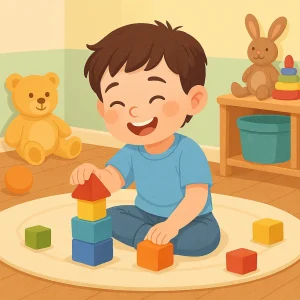8 Real-Life Challenges of Cluttering Speech Disorder
Last Updated: April 14, 2025
Is your child talking so fast that their words blur together—or do they constantly get asked to repeat themselves? It might be more than just a “fast-talking habit.”
Cluttering is a lesser-known but real speech fluency disorder that affects both children and adults. Unlike stuttering, cluttering can fly under the radar—causing jumbled, rushed, or disorganized speech without the speaker even realizing it. This can lead to constant misunderstandings, frustration, and even social withdrawal.
If you’ve noticed speech that’s too fast, unclear, or hard to follow, this guide will help you understand the real signs of cluttering, its emotional impact, and how speech therapy can make a powerful difference.
Worried about your child’s fast or unclear speech? Book a free consultation with a speech therapist today to explore personalized support.
What is Cluttering Speech Disorder?
Cluttering is a fluency disorder where a person’s speech sounds too fast, jumbled, or unclear, making it hard for others to understand. It’s not about forgetting words—it’s about the way words come out. The speech may sound rushed, uneven, or even incomplete at times.
Unlike stuttering, which usually involves repeating sounds or blocks, cluttering often goes unnoticed because the speaker may not even realize they’re speaking in a disorganized way. But for the listener, it can feel like trying to follow a sentence in fast-forward mode.
Cluttering speech disorder affects both children and adults, though it’s more noticeable when a child starts forming longer sentences or when an adult faces communication challenges at work or socially.
Key Signs of Cluttering in Adults and Children
Spotting cluttering can be tricky, especially because it varies from person to person. Here are some common signs to look out for:
| Signs of Cluttering | How It Shows Up |
|---|---|
| Rapid speech rate | Talking too fast without pauses |
| Irregular speech rhythm | Words may speed up, slow down, or blend together |
| Deleting or slurring syllables | “I dunno” becomes “Idno” or “wanna go” as “wago” |
| Disorganized thoughts while speaking | Sentences jump from one idea to another |
| Little awareness of unclear speech | Speaker may not realize they’re hard to understand |
| Repeating words or starting over | “I want—I mean, I want to go to the store…” |
| Pausing in odd places | Awkward silences that break the natural speech flow |
Why Cluttering Often Goes Unnoticed
Cluttering is one of those speech issues that can fly under the radar, especially in children and adults who appear talkative or expressive. But just because someone speaks a lot doesn’t mean they’re always being understood. That’s the tricky part about cluttered speech in adults and kids—it often sounds like fast or messy talking, which people brush off as a habit rather than a fluency disorder.
The symptoms of cluttering don’t always stand out the way stuttering does. Instead of clear disruptions like repeating words, cluttering tends to sneak in with unclear, rushed, or disorganized speech patterns. This makes it easy to miss—even for teachers, parents, or even the person themselves.
Misunderstandings with Teachers, Parents, or Employers
People with cluttering often face unfair assumptions in daily life. Here’s how cluttered speech can lead to misjudgments:
- In School: A student with cluttering might be seen as lazy, distracted, or disorganized—when really, they’re trying hard but struggling with fluency.
- At Home: Parents might think their child is “just mumbling” or “not paying attention” during conversations.
- At Work: Adults may be misjudged as unprepared or careless in meetings or interviews because of rushed or unclear speech.
Self-awareness Struggles in Cluttering
One of the biggest challenges with cluttering is that people often don’t realize they have it. Unlike stuttering—where the speaker can clearly feel a block or repetition—cluttering may not feel like a problem at all to the person speaking.
Many individuals:
- Don’t notice when their words are jumbled or slurred
- Are surprised when people ask them to slow down or repeat
- May feel frustrated when they think they’re communicating clearly, but others don’t get the message
8 Real-Life Challenges Faced by People With Cluttering
Challenge #1 – Speaking Too Fast to Be Understood
One of the most noticeable signs of cluttering is speaking too fast—so fast that even close friends or family members may struggle to understand what’s being said. This is known as a fast speech disorder, and it often causes speech to become rushed, unclear, and lacking in natural pauses.
For the speaker, everything feels normal. But for the listener, it sounds like a blur of words strung together without rhythm or clarity. That’s because cluttering often includes an irregular speech rhythm, where syllables are dropped, words are mashed together, or key parts of a sentence are skipped altogether.
Why This Happens
People with cluttering tend to:
- Speak faster than their brain can organize thoughts
- Skip or blend sounds together
- Forget to pause between words or phrases
- Assume the listener is keeping up—even when they aren’t
Impact on Speech Intelligibility
All of this affects speech intelligibility, or how clearly others can understand you. It can lead to:
- Listeners asking “What?” or “Say that again?” frequently
- Interruptions in conversations
- Speakers feeling frustrated, embarrassed, or ignored
And over time, it can chip away at confidence, especially in social or academic situations.
Small Changes, Big Difference
With the right guidance, speech can be slowed down and improved. A few small adjustments—like intentional pauses, breathing techniques, and thought planning—can make a big impact on clarity.
Challenge #2 – Difficulty in Organizing Thoughts During Speech
Have you ever started a sentence, only to forget where you were going with it halfway through? For people with cluttering, this happens a lot more often—and not just occasionally.
This challenge stems from disorganized speech, where thoughts move faster than the mouth can keep up. The result? Sentences that jump around, trail off, or mix up ideas, making it hard for the listener to follow and frustrating for the speaker to explain.
It’s not that the person doesn’t know what they want to say—they do. The problem lies in how those thoughts come out. This is a key verbal fluency issue that affects many people with cluttering.
Why This Happens
When someone with cluttering starts talking, their brain may be processing ideas quickly, but their speech can’t always keep up. This leads to:
- Sentence fragments: Starting one idea and switching to another before finishing
- Out-of-order thoughts: Saying things in a confusing or reversed sequence
- Inconsistent flow: Skipping over connecting words or losing track of key points
Here’s how it typically plays out:
Real-Life Example Table
| What They Want to Say | What Comes Out |
|---|---|
| “I was late to school because the bus broke down” | “Bus… late… no, I mean, school was late” |
| “I forgot my homework and went back to get it” | “Forgot—uh, I had to… the homework… back” |
How This Affects Communication
When thoughts come out in a disorganized way, it can lead to:
- Misunderstandings in daily conversations
- Embarrassment when speaking in front of others
- Avoidance of talking altogether in group settings
- Frustration from constantly having to explain or repeat
This can affect school, work, friendships, and even self-confidence—especially if others respond with confusion or impatience.
Challenge #3 – Negative Impact on Social Interactions
Talking with friends, answering in class, or meeting new people might seem easy for most. But for someone with a cluttering communication disorder, these everyday moments can feel very hard.
Because of communication difficulties, others may not understand what the person is trying to say. This can lead to confusion, awkward moments, and even being ignored.
How Cluttering Affects Social Life
- Talking in a group: Others may find the speech hard to follow and lose interest.
- Telling a story or joke: Words may come out too fast or mixed up, making it hard to understand.
- Answering questions: The reply might sound unclear or disorganized.
- Meeting new people: Nervousness and cluttered speech lower confidence.
Common Reactions from Others
Because of the way cluttered speech sounds, people might:
- Misunderstand what’s being said
- Interrupt or speak over the person
- Think they are confused or not prepared
- Avoid future conversations
These reactions can make someone feel left out or embarrassed.
Emotional Effects of Cluttering
The social struggles often lead to:
- Shyness or avoiding group talks
- Fear of being judged while speaking
- Trouble making friends or building relationships
- Feeling “different” or isolated
These feelings are common, especially in teens and adults who notice their speech differences.
How Support Can Help
The good news is that with the right help, things can get better:
- Speech therapy teaches how to slow down and organize thoughts
- Regular practice builds speaking confidence
- Supportive strategies help in social settings
Challenge #4 – Poor Academic or Workplace Performance
In schools and workplaces, speaking clearly is often expected. Whether it’s giving a class presentation or sharing ideas in a meeting, clear communication plays a big role in how a person is seen. But for those with speech fluency issues, especially caused by cluttering, this can be a daily challenge.
Even though the person may be smart and capable, their speech might come out too fast, jumbled, or unclear. This leads to speech problems in adults and students that are often misunderstood as carelessness or nervousness.
Why Cluttering Affects Academic & Work Life
Here’s how cluttering impacts different environments:
- At school, students may have trouble answering questions clearly, reading aloud, or giving oral responses. Their speech might sound rushed or disorganized.
- In college, cluttering can make it hard to take part in seminars or give smooth presentations. This can lead to lower participation and unclear communication during group work.
- In the workplace, miscommunication is common. People with cluttering may be skipped over in meetings, misunderstood while giving instructions, or asked to repeat themselves often.
How It Affects Performance
These speech challenges can lead to:
- Lower grades, even if the student understands the material
- Missed chances for promotions or leadership roles
- Avoiding speaking opportunities due to fear or stress
- Needing to explain or repeat things many times, which can be frustrating
Common Misunderstandings
Speech problems in adults caused by cluttering are often mistaken for:
- Being unprepared
- Lacking knowledge
- Seeming nervous or disinterested
- Having a poor attitude
These wrong assumptions can negatively affect school reports, job reviews, and overall confidence.
Boosting Communication Confidence
Improving speech fluency issues helps not only with speaking clearly, but also with building confidence and better performance. When a person learns to slow down and organize their thoughts, they start to feel more in control.
At Wellness Hub, we offer online speech therapy tailored for teens, students, and working professionals. Our sessions help individuals express themselves better, feel confident in meetings and classrooms, and overcome the hidden challenges of cluttering.
Challenge #5 – Emotional Struggles and Anxiety
Cluttering doesn’t just change how someone talks—it affects how they feel about talking. Many children, teens, and adults who struggle with speaking too fast also deal with deep fears: the fear of being misunderstood, judged, or ignored.
These feelings can lead to social anxiety and communication problems, which can sometimes be harder to deal with than the speech issue itself.
The Emotional Side of Cluttering
Cluttering often brings up emotions like:
- Worry before speaking in front of others
- Fear of being laughed at or misunderstood
- Frustration from being asked to repeat themselves
- Embarrassment during group chats
- Avoiding social events or conversations altogether
What Triggers These Feelings
Many emotional challenges come from past experiences, like:
- Social withdrawal happens after being ignored or misunderstood often
- Low self-esteem builds from hearing negative comments about how they speak
- Overthinking happens because they fear making speech mistakes
- Panic during conversations is common when speaking too fast confuses others
These emotional struggles often grow worse in settings like school or work, where speaking clearly is expected and performance is judged.
How It Affects Everyday Life
People facing social anxiety and communication problems may:
- Stay silent even when they have good ideas
- Avoid answering questions in class or meetings
- Choose texting instead of phone calls to feel safe
- Feel mentally tired after socializing, even with friends
There Is Hope
The good news is, these feelings can change.
With the right support, awareness, and tools, people with cluttering can learn to slow down, feel more confident, and enjoy conversations again. Speech therapy can help improve clarity—and more importantly, rebuild self-confidence.
Challenge #6 – Listeners Often Misunderstand Them
One of the most frustrating parts of cluttering is this: you know what you’re trying to say, but others just don’t get it. This kind of listener misunderstanding happens often, and over time, it can feel discouraging and isolating.
People with cluttering often speak too quickly or mix words together. These are called speech disfluencies, and they can include skipping syllables, repeating parts of words, or blending phrases. While the speaker feels like everything made sense in their head, the listener may hear it as jumbled or unclear.
Common Listener Reactions
When someone hears cluttered speech, they might:
- Ask, “Can you say that again?”
- Interrupt to “help” finish the sentence
- Look confused or impatient
- Misunderstand what was said and respond incorrectly
These reactions aren’t meant to be hurtful—but they often hurt, especially when they happen repeatedly.
How Cluttering Is Heard vs. What’s Meant
Let’s look at some quick examples:
- Saying “I went to the store with my mom” may sound too fast or jumbled, leading to “Sorry, can you repeat that?”
- Saying “Th–th–then I went…uh…store” sounds disfluent, which might cause someone to interrupt.
- Saying “I forgot to—no, wait—my bag broke” can feel confusing, and the listener may lose track of the story.
Even though the speaker knows exactly what they meant, the listener misunderstanding can lead to repeated corrections or frustration.
Emotional Impact of Not Being Understood
Being misunderstood again and again can lead to:
- Having to repeat yourself often
- Feeling anxious before speaking
- Avoiding long explanations
- Feeling like your words don’t matter
Over time, this makes people feel less confident—not because they lack ideas, but because it’s hard to express them clearly.
How Support Makes a Difference
The good news? These challenges can be improved. With the right tools, people with cluttering can:
- Learn to slow down while speaking
- Use small pauses to separate thoughts
- Plan what they want to say
- Become more aware of how their speech sounds to others
Challenge #7 – Trouble with Public Speaking and Presentations
Public speaking is challenging for many people. But for someone with a fluency disorder like cluttering, it can feel almost impossible. Whether it’s reading aloud in school, giving a presentation at work, or introducing themselves in a group, these moments bring a lot of pressure—especially when speech rate problems are involved.
Why Presentations Are Hard with Cluttering
Cluttering makes people:
- Speak too fast, especially when nervous
- Skip words or blend sentences together
- Lose track of what they were saying
- Struggle to organize their ideas clearly
- Get upset when they see the audience confused
Even when someone knows exactly what they want to say, their fast or jumbled speech can make the message hard to understand.
Emotional Reactions During Public Speaking
Because of these challenges, people with cluttering may:
- Speak even faster due to stress
- Forget parts of their speech
- Worry too much about making mistakes
- Avoid speaking in public altogether
- Feel anxious days before a speech or presentation
What Happens Over Time
Without support, these struggles often lead to:
- Skipping speaking opportunities
- Staying silent in meetings or group projects
- Holding back ideas—even when they matter
- Feeling frustrated, embarrassed, or judged
But remember, this doesn’t mean the person lacks knowledge. It’s the fluency disorder getting in the way of expressing those thoughts clearly.
The Good News: It Can Be Improved
Speech rate problems can be managed with the right tools and support. People with cluttering can learn to:
- Slow down their speech
- Practice pausing between thoughts
- Organize ideas before speaking
- Build confidence even in public settings
Challenge #8 – Difficulty Finding the Right Support
One of the biggest struggles for people with cluttering isn’t just about speech—it’s about finding the right kind of help. Unlike more common speech disorders like stuttering, cluttering is less understood. Many parents, teachers, and even speech therapists may not fully recognize it or know how to treat cluttering effectively.
Without proper support, progress is delayed and communication becomes harder.
Many Therapists Misdiagnose or Overlook Cluttering
Cluttering is often:
- Misdiagnosed as fast talking or unclear speech
- Confused with stuttering, ADHD, or learning issues
- Seen as a mild issue unless it affects school or work clearly
- Missed due to limited training on fluency disorders in general speech therapy courses
This leaves many children, teens, and even adults feeling misunderstood—they know something isn’t right, but they can’t find someone who understands how to help.
Why It’s Hard to Find Support
- Lack of awareness about cluttering symptoms among professionals
- Overlap with other conditions makes diagnosis tricky
- No clear blocks or stutters can make it easy to overlook
- Few therapy centers specialize in cluttering-specific treatment
As a result, many families go in circles trying to find someone who truly understands speech therapy for cluttering.
How Wellness Hub Supports Individuals With Cluttering
At Wellness Hub, we understand that cluttering is a real and unique fluency disorder—not just fast talking. That’s why our therapy is:
- Personalized to match each person’s speech pattern
- Simple and practical, focusing on real-world speaking situations
- Guided by trained professionals who understand cluttering deeply
Our online sessions help individuals:
- Understand what cluttering is and how it impacts their speech
- Learn strategies to slow down and self-monitor
- Organize thoughts clearly before speaking
- Build awareness of how their speech sounds to others
Effective Speech Therapy Options for Cluttering
Cluttering can feel overwhelming at times—but with the right support, real progress is absolutely possible. The key is finding therapy strategies for speech disorders that actually work for your (or your child’s) specific needs. Unlike one-size-fits-all methods, effective cluttering treatment focuses on improving speech fluency, building awareness, and boosting confidence over time.
At Wellness Hub, we believe therapy should be simple, flexible, and designed around real life. That’s why we offer practical options that work for both kids and adults.
Home-Based Support Through Wellness Hub’s Programs
We know that many families prefer learning from home—especially when it comes to speech therapy. That’s why our home-based therapy programs are designed to fit easily into your daily routine.
What makes our home programs effective?
- Step-by-step video guidance from expert speech therapists
- Printable activities, visuals, and practice tools for daily use
- Parent-friendly instructions to help guide children at home
- Strategies that target common cluttering issues like fast speech, poor rhythm, and unclear phrasing
Customized Online Speech Therapy for Adults and Kids
Some people need one-on-one attention to make real progress—and that’s where our online speech therapy sessions come in. These personalized sessions are ideal for those who want live guidance from trained professionals.
With our online program, you can expect:
- Customized therapy plans based on age, needs, and speech goals
- Real-time coaching to slow speech, structure thoughts, and build fluency
- Progress tracking to see how far you’ve come
- A friendly, judgment-free space to practice and improve
Whether you’re an adult dealing with speech challenges at work or a child struggling with classroom conversations, our therapists are here to help—on your schedule, from your space.
Book a free consultation and explore our online speech therapy services tailored for cluttering and other fluency disorders.
Conclusion
If you or your child is facing cluttering, remember—you’re not alone. Cluttering is a communication fluency disorder, but with the right help, progress is possible. Every small improvement matters. At Wellness Hub, we offer expert support through online speech therapy and easy home-based programs to help you speak clearly and confidently. Our team understands cluttering and provides personalized care that fits your needs. You don’t have to face speech struggles on your own.
Frequently Asked Questions:
1. What is cluttering in speech?
Cluttering is a type of speech fluency disorder where a person talks too fast or jumbles their words. It can make their speech sound unclear or hard to follow.
2. How is cluttering different from stuttering?
While stuttering has repeated sounds or blocks, cluttering often sounds rushed or disorganized. People with cluttering may not even realize their speech is hard to understand.
3. What causes cluttered speech in kids?
Cluttered speech can happen when kids speak before they fully form their thoughts. It may be linked to fast thinking, poor speech rhythm, or other fluency issues.
4. Can cluttering be treated with speech therapy?
Yes. Speech therapy for cluttering helps children slow down, plan their words, and improve clarity. With regular sessions, most kids show great progress.
5. What are the signs of cluttering in children?
Signs include speaking too fast, skipping words, being hard to understand, or starting sentences and not finishing them clearly.
6. Does cluttering affect school performance?
Yes, it can. Kids may struggle during class presentations or when answering questions. Teachers might mistake it for carelessness or lack of focus.
7. Can adults also have cluttering?
Yes. Cluttering speech disorder in adults can affect work communication, meetings, and confidence in social settings.
8. How do I help my child at home with cluttering?
You can support your child by encouraging slow speech, practicing simple phrases, and using home-based speech therapy tools like flashcards or visual prompts.
9. Where can I find expert help for cluttering?
You can find professional speech therapy help online through platforms like Wellness Hub, which offers therapy plans tailored for cluttering and fluency issues.
10. Is cluttering permanent or can it improve?
With early support and the right therapy, most people with cluttering can make big improvements in speech clarity and confidence.
About the Author:
Shravanaveena Gajula
M.Sc ., Speech and Language Pathology (5+ years of experience)
Shravanaveena Gajula is a dedicated Audiologist and Speech-Language Pathologist with a BASLP and an M.Sc in Speech and Language Pathology. With experience spanning multiple settings, including Wellness Hub and Ashray Akruti, Veena specializes in a wide range of disorders from developmental issues in children to speech and language assessments in adults. Her expertise includes parent counseling, managing speech sound and fluency disorders, and creating individualized therapy programs. Veena is also PROMPT certified and an author of several insightful blogs on speech and language pathology, aiming to educate and assist caregivers in supporting their loved ones.
Book your Free Consultation Today
Parent/Caregiver Info:
Client’s Details:
* Error Message









